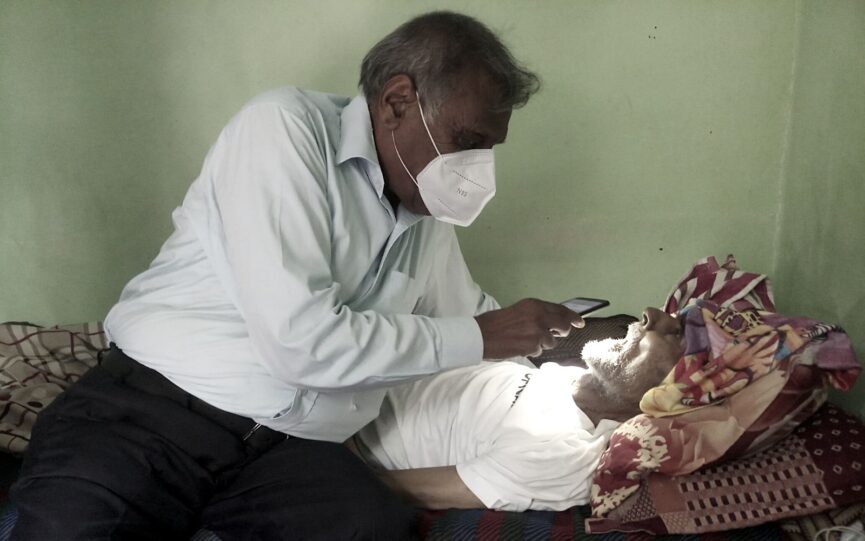Amar was 56 years old. A chauffeur by occupation, he was from a small village called Sitapur in Lucknow and had been living in Delhi with his wife and three daughters in a rented house.
For some time, Amar had been experiencing issues with passing stool. Out of embarrassment, he didn’t share this with anyone. When it didn’t get any better, he finally decided to tell his wife, who suggested he consult a general physician near their residence, who further referred him to a hospital.
Cancer forced Amar to give up his job. The responsibility of the family expenditure fell on the shoulders of his eldest daughter, who luckily had a job. The other two daughters are students and preparing for entrance exams for government jobs.
Amar’s eldest daughter also had an ESI card from her workplace, so she was able to admit her father in an ESI hospital where all his tests were done and he was diagnosed with cancer of the rectum. His treatment immediately commenced at Shanti Mukund Hospital, but the cancer had already advanced to a level where surgery was not a possibility. The hospital referred Amar to CanSupport for palliative care at home. Palliative care is specialized medical care for people with serious illnesses. It focuses on providing relief from the symptoms, pain and stress of a serious illness.
During their first visit, the home care team from CanSupport found Amar going through a number of physical symptoms. The other family members were suffering too, as it was painful to watch him suffer.
Amar’s primary caregiver was his wife. The team doctor promptly addressed all the physical symptoms of Amar and provided him with medication. The nurse gave advice on dressing and diet and the counsellor tried to understand the psychosocial distress that the family was going through by engaging Amar and his wife in a dialogue. The wife broke down and expressed her anxieties. She was worried as to how would she be able to take care of her husband at home in this condition.
The goal of palliative care is to improve the quality of life of both the patient and the family. The counsellor actively listened to Amar and his wife and helped relieve their worries and concerns by ensuring them of their constant care and support. He told Amar’s wife that she could call the team anytime of the day or night for any kind of assistance and that the team would regularly visit them.
On their next visit, the team found the patient in a much better state since his physical symptoms were in control and this time; he was willing to talk more to the team. On talking to Amar, the counsellor learnt he was suffering from a feeling of guilt. The counsellor listened to him with a lot of warmth and tried to delve deeper into his feelings of guilt and regret.
On the third visit, the team found Amar experiencing a feeling of deep sadness. He was also concerned about how would he get cured or get looked after at home, now that the hospital had stopped his treatment. The counsellor assured him and his wife that a lot can be done at home and that’s what the team was there for. The counsellor told Amar the team is going to help him all along and he needn’t worry or feel sad and that the team would take care of all his symptoms at home. They even assured Amar that the team would inform and train his wife on how to look after him at home.
Amar also shared his worries about the future of his children and how he wished he could build his own house back in his village. He shared how happy he was that his second daughter had been selected to join the Delhi police and how proud he was that his family looked after him so well, but he felt guilty that he couldn’t do much for his family. Sharing this, he got very emotional. The counsellor listened to the family and empathetically had to break the bad news. He counselled the family to understand and accept the prognosis.
For a few visits post breaking the bad news, the counsellor continued to do end of life counselling.
Upon being encouraged by the counsellor to express his wishes, Amar shared that he wanted to meet his sister and the other members of his family who lived in his village.
A couple of days later, the team got a call from Amar’s wife saying that Amar was behaving strangely. The team immediately visited the family and they found Amar in a state of delirium. They comforted his wife by sharing that this was normal with some patients and that she needn’t panic. They informed her that his condition could be managed at home with the help of medication.
On their next visit the team found Amar in a happy zone and he shared that his sister and brother had visited him and how happy that made him feel.
Amar’s health was gradually deteriorating and within a few days post meeting his close family members from his village, he left this world.
When the team visited the family post Amar’s demise for bereavement counselling. His eldest daughter expressed her gratitude and said, “I really want you to thank you all for taking care of my father during his last days and giving us mental and emotional support. We will never forget your kindness and support.”
To protect the privacy of the patient and the family, the name/s in the story have been changed. There are many people like Amar and his family who need palliative care but they don’t know where to go. While CanSupport is doing its best the reach out to people informing them about their services, we request you to spread the word.
Share our Helpline Number 011 41010539 with all the needy people. Though all CanSupport services are free of charge for patients, the cost of reaching out to patients and caring for them cost Rs. 1800/- per visit per patient.
If you would like to support our cause, please donate at https://cansupport.org/donate
(Picture in display is representation of CanSupport Home care Services)

